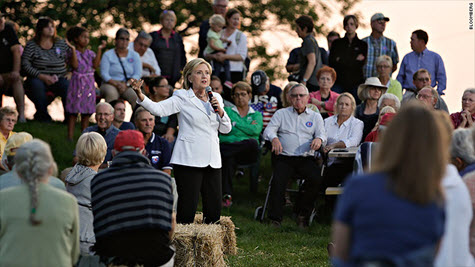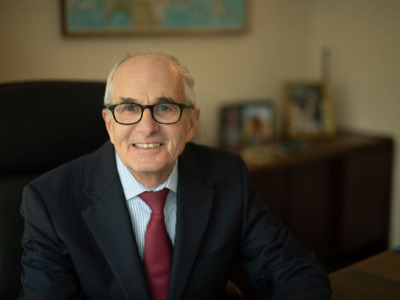While agriculture, like many other issues, has been overshadowed in the presidential campaign this year, if you look closely there is evidence on how Secretary Clinton would approach agriculture policy and rural America:
- Senator Clinton had a strong record in support of agriculture while serving in the Senate and consistently supported the farm bill;
- Secretary Clinton addressed agriculture at the State Department connecting food security to national security;
- Rural for Hillary has released highlights of issues important to agriculture and rural America;
- Former Deputy Secretary Kathleen Merrigan was authorized to serve as a surrogate for Secretary Clinton at the Farm Foundation;
- A number of agriculture CEOs met with Clinton staff at the Clinton headquarters in Brooklyn; and
- Former Iowa Governor Tom Vilsack has gone on record a number of times in support of Secretary Clinton laying out positions that impact rural America and agriculture policy.
One of the common themes is that Secretary Hillary Clinton supports agriculture from the small farms that feed the community to the large farms that feed the world. “We need it all” said Dr. Merrigan at the Farm Foundation, “from organic to biotechnology.”
Soon after becoming Secretary of State in 2009, Secretary Clinton announced the winner of the World Food Prize stressing the importance of science to food production. The Secretary spoke at some length about Dr. Norman Borlaug and then honored Dr. Gabisa Ejeta for his contribution “in the science of plant genetics.” She went on to say “we will seek to increase agriculture productivity by expanding access to quality seeds, fertilizers, irrigation tools, and the credit to purchase them and the training to use them.”
Back home in Iowa, candidate Clinton said “the agenda that I am putting forth for rural America is very much in line with what Tom (former Iowa Governor Tom Vilsack) did here in Iowa and what he is doing a the Department of Agriculture……We have to stand with our farmers, give them the tools and support they need to boost both production and profits.”

Recognizing that the vast majority of Americans who live in rural America don’t farm, or rely on second jobs “in town” Secretary Clinton has made a strong commitment to the broader needs or rural America. “We’re going to bring diverse economic development to rural communities to support our farmers and others in small towns who keep America going.” In Clinton’s position papers, in Dr. Merrigan comments at the Farm Foundation, and in the discussion we had at the Brooklyn Clinton headquarters, there has been an emphasis on clean energy jobs, broadband, high speed Internet, health care and rural education.
“And then there is immigration” she said at an Iowa event. “The fact is American agriculture is heavily dependent of immigrant labor, form the orchards of California to the processing plants of Iowa to the groves of Florida. We’re talking about billions of dollars in income lost because of farm worker shortages. Comprehensive immigration reform would help address the problem and give a boost to rural communities.”
Tom Vilsack summed up his support for Hillary this way in an Op Ed on October 19, 2016 in the Daily Times Herald:
“Over a year ago, I was proud to stand beside her at a community college in Des Moines, Iowa, where she laid out her vision for rural America. This plan was grounded in a life’s work fighting for working families and the most vulnerable among us. Over the past few years, Hillary has listened to the needs and dreams of thousands of rural Americans, and then she did what she does best — she built a thoughtful, comprehensive strategy that invests in an economy that works for everyone — not just those at the top.
“These policies reflect Hillary’s understanding of the hard work our rural communities do for the good of our country — providing our food, the fiber for our clothes, the energy for our homes and businesses, and nearly 40 percent of our military members. As president, Hillary will support our farmers and ranchers, encouraging the next generation by offering training and credit, strengthening the safety net to help them through unanticipated challenges, bolstering our regional food systems, and fostering a renewable-energy future for the United States that utilizes wind, solar and biofuels.”
This article drew on all of the sources listed above to try and paint a realistic picture. In short, Secretary Clinton has a proven record in support of agriculture, rural America and global food security. But let me close on non-partisan point…..
Both of the major political parties draw from a large base of support and those who care about agriculture and rural America must be prepared to engage the new Administration, and future Administrations, across the board. The focus cannot be just on the Department of Agriculture. Politically speaking, agriculture is the victim of its own success with only one percent of the country feeding the rest of us, and much of the world.
Outreach must be to White House from the West Wing to the Office of Science and Technology Policy, the Trade Representative, the Office of Management and Budget, and Domestic Policy. It is important to engage the Environmental Protection Agency, the Food and Drug Administration and the Office of the First Lady (or First Spouse). While some organizations have already reached out to both campaigns, the outreach should ramp during the transition period from November 9th-January 20th; continue during the confirmation process and then courtesy calls once key people are in place.
The legislative and regulatory processes do not ever end. They are about to start all over again with a new Administration. Let’s make sure agriculture’s voice is heard.
Marshall Matz specializes in agriculture at OFW Law in Washington, D.C. He was formerly Counsel to the Senate Committee on Agriculture and Chairman of the Obama for President, Agriculture Committee in 2008.
#30
For more news, go to: www.Agri-Pulse.com

